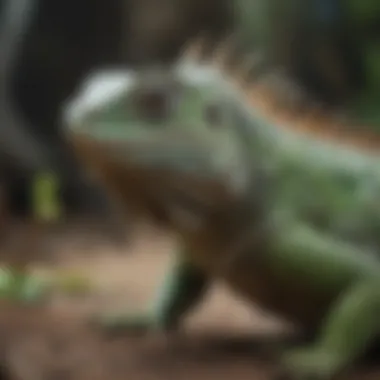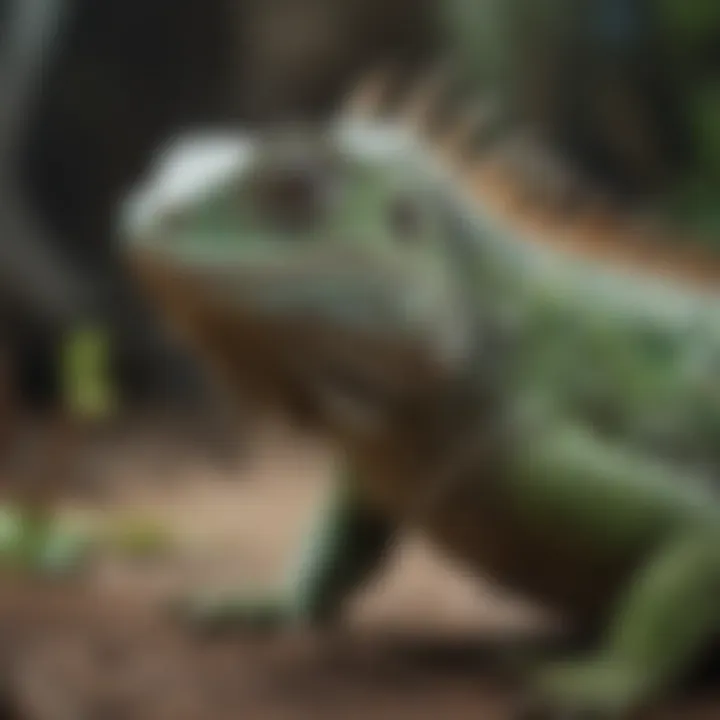Iguana Nutrition: A Comprehensive Guide for Owners


Intro
When it comes to caring for iguanas, one cannot overlook the vital role nutrition plays. Just like a well-tuned engine needs the right fuel to run smoothly, iguanas require a balanced diet filled with the necessary nutrients to thrive. Yet, despite their popularity as pets, there’s a surprising gap in understanding what these majestic reptiles truly need when it comes to their meals.
In this guide, we will delve into the ins and outs of iguana nutrition. From deciphering their natural dietary habits to dispelling common myths, every aspect will be covered without leaving any stone unturned. Many iguana owners are unaware that these reptiles are predominantly herbivorous, and feeding them improperly can lead to severe health issues. We’ll also discuss the significance of introducing variety in their diets, which is key to enhancing their well-being.
Important Points Covered
- The essential nutrients iguanas need daily.
- Common misconceptions about iguana diets that could lead to neglect.
- Practical feeding strategies to help ensure your iguana remains healthy.
- The role of dietary supplements and how they fit into an iguana's nutrition plan.
By the end of this guide, you’ll be equipped with the knowledge needed to provide your iguana with the optimal nutrition it requires for a long and healthy life. It’s not just about feeding; it’s about understanding their needs and how best to meet them. So let’s jump into the world of iguana nutrition and discover everything there is to know!
Understanding Iguanas and Their Dietary Needs
When it comes to the well-being of iguanas, understanding their dietary needs stands as a cornerstone. Not just for pet owners, but for anyone keen on keeping these reptiles healthy, knowing the whys and hows behind their nutrition is utterly vital.
Iguanas are herbivorous creatures, which means their diet is predominantly plant-based. A well-rounded understanding of their dietary requirements can help prevent several health issues down the line. For instance, an iguana deprived of necessary nutrients can develop a condition known as metabolic bone disease, which is often linked to insufficient calcium and Vitamin D3. Thus, an educated approach to their diet can mean the difference between a thriving iguana and one suffering from avoidable ailments.
In the following sections, we will break down the various aspects of iguana nutrition. We'll explore the essential nutrients, delve into their natural dietary habits, and address common misconceptions that might lead caretakers astray. These elements collectively inform the best practices in iguana feeding, ensuring that pet owners can foster an environment conducive to growth and health.
An Overview of Iguana Species
Iguanas are a diverse group, comprising many species, each with unique characteristics. The most common species kept as pets are the Green Iguana (Iguana iguana) and the Savanah Iguana. While both thrive on a mostly plant-based diet, the Green Iguana is particularly popular due to its eye-catching color and generally docile disposition.
Each species has nuances in their dietary needs. For instance, while Green Iguanas predominantly feast on foliage, some other species might incorporate different kinds of plant matter in their diet. Understanding these differences is crucial, as the wrong diet can lead to serious health issues.
Natural Habitat and Its Influence on Diet
The natural habitat of iguanas influences their dietary preferences heavily. In the wild, iguanas are often found in tropical and subtropical regions, where lush vegetation is abundant. These green environments provide a variety of leaves, flowers, and fruits, which form the bulk of their diet.
The availability of food sources in these habitats shapes not only their dietary habits, but their evolutionary path as well. For example, iguanas in rainforests might have access to different fruits or leaves than those residing in dry areas, thus affecting them nutritionally. This varied habitat directly informs how owners should feed their captive iguanas. By mimicking their natural food sources, you give them a chance to stay healthy and maintain their natural behaviors.
Incorporating a mix of leafy greens and occasional fruits that mimic their wild diet can lead to a healthier and longer life for your iguana.
"A well-fed iguana is a happy iguana. Just as humans become selective eaters, the same goes for these reptiles. Respecting their natural preferences can optimize their health!"
By understanding iguanas and their dietary needs profoundly, we lay the groundwork for a successful caregiving experience. Caregivers capable of recognizing the natural influences on their reptile's health will ultimately create better living conditions for their pet.
The Essential Nutrients for Iguanas
Understanding what iguanas need for their health is key for their owners. These reptiles, being herbivores, have a specific set of dietary needs. Providing the right nutrients helps avoid health issues and ensures they thrive in a controlled environment.
The Role of Calcium and Phosphorus
Calcium and phosphorus stand as the pillars of iguana nutrition. These minerals keep the iguana's bones strong and prevent metabolic bone disease, a serious condition in reptiles. Achieving the right ratio of these minerals is crucial; ideally, it should be about 2:1 in favor of calcium. Too much phosphorus can inhibit calcium absorption, leading to health issues. When feeding iguanas, leafy greens like collard greens and dandelion greens are excellent sources of calcium.
- Sources of Calcium:
- Collard Greens
- Kale
- Mustard Greens
However, also keep in mind that not all greens come fortified with these minerals. For certain types of iguanas, even a sprinkle of calcium powder on food might help. Emails often flooded with questions about how to properly balance these nutrients are an indicator of the confusion many face. Understanding the role here can clear the fog.
Importance of Vitamins and Minerals


Just as calcium and phosphorus are vital, other vitamins and minerals play a significant role in the diet of iguanas. Vitamin A, for instance, keeps skin and eyes healthy. A deficiency can lead to issues such as shedding problems and respiratory infections. Green vegetables often provide ample amounts of this nutrient.
- Key Vitamins for Iguanas:
- Vitamin A
- Vitamin D3
- Vitamin E
Vitamin D3, on the other hand, is particularly important for calcium absorption. Iguanas that have limited exposure to sunlight may require supplementation of this vitamin to prevent deficiencies. Minerals like magnesium and potassium also contribute to overall well-being, supporting muscle function and various metabolic processes.
Fats, Proteins, and Carbohydrates Overview
It’s easy to overlook fats when focusing on other nutrients, but healthy fats, while largely necessary in small amounts, are just as important. They store energy, protect organs, and contribute to overall health. Yet, too many fats can lead to obesity—an issue that is not only detrimental but also preventable.
For proteins, iguanas mainly obtain them through their leafy green diet, while carbohydrates serve as an energy source. A diverse selection of fruits and vegetables provides essential carbs, supporting both energy levels and digestion. Just remember, variety is the spice of life! This ensures iguanas don’t develop dietary deficiencies.
In wrapping up this segment, keeping an eye on nutritional balance sets the stage for a healthy iguana. Various foods contribute essential nutrients, complementing one another when chosen wisely.
Remember, a well-rounded diet is more than just fulfilling the basics—it's about understanding the science behind what an iguana needs to lead a healthy life.
Natural Dietary Habits of Iguanas
Understanding the natural dietary habits of iguanas is vital for anyone looking to care for these reptiles properly. Their nutritional needs are closely tied to what they would naturally consume in the wild, which is largely plant-based. When owners stray from these typical eating habits, they risk their iguana's health and well-being. This section dives into the three key components of iguanas’ diets: leafy greens and vegetables, fruits, and the necessary avoidance of animal protein, all of which play a pivotal role in contributing to their overall health.
Leafy Greens and Vegetables
Leafy greens and vegetables are the cornerstone of an iguana's diet, providing essential vitamins and minerals without too many sugars or calories. Greens like collard greens, kale, and dandelion greens not only offer fiber but also contain high levels of calcium, which is crucial for bone health. While it may sound simple, diversity in leafy greens is crucial.
The variety helps prevent the iguana from developing aversions to certain foods and ensures that they receive a wide range of nutrients. Make sure to wash the greens thoroughly to rid them of any pesticide residues or harmful chemicals.
Offering kale one day and collard greens the next can help keep things fresh. Serve these veggies chopped into manageable pieces to facilitate eating. It’s as if you’re cooking a gourmet meal but for a precise palate—each leaf, each slice counts toward their health!
Fruits in Moderation
Fruits can be a tantalizing treat for your iguana but should never be the star of the show. While iguanas do enjoy fruits like papaya, mangoes, and berries, it is critical to offer these in moderation. Fruits often contain higher sugar levels, which, if consumed in excess, can lead to obesity or other metabolic issues.
Think of fruit as a dessert; enjoyable and delicious, but best served sparingly. A small piece every so often is sufficient to keep it enticing without tipping the balance of their overall diet.
When introducing new fruits, cut them into small chunks to make them more accessible and less daunting. However, always keep an eye on how your iguana responds to these sugarier options, as not all fruits will be suitable for every iguana.
"An ounce of prevention is worth a pound of cure!"
This saying holds especially true when dealing with the dietary needs of iguanas. Mixing too much sugary fruit into their meals can lead to health complications that are often easier to avoid than to fix.
Avoiding Animal Protein
Iguanas are strictly herbivores, and this dietary trait carries a lot of weight. Their digestive systems are simply not equipped to process animal protein, which can lead to severe health issues. Offering foods like insects or meats can result in kidney problems or result in a shorter lifespan. This is especially true for younger iguanas whose bodies are still developing.
The idea that iguanas need protein from meat sources is a common misconception; they can get all necessary nutritional elements from their plant-based diet. Focusing instead on a colorful array of greens and vegetables ensures that they will have sufficient protein from the natural sources they are adapted to.
So, steer clear of any animal protein altogether, as it can disrupt their health like a pebble in a shoe.
With this understanding of iguanas' natural dietary habits, pet owners can better craft an appropriate and enriching diet. Consistency in offering the right leafy greens, moderation in fruit treats, and a strict avoidance of animal proteins are the foundational elements to achieving optimal health for iguanas.
Common Misconceptions About Iguana Feeding


Feeding iguanas is an art and a science, intertwined with some common misunderstandings that can easily lead to poor nutrition choices. It’s vital for both seasoned owners and newcomers to recognize and refute these myths. Understanding these misconceptions allows for better care and a healthier life for our green companions. The rationale behind focusing on these myths is that misinformation can have dire consequences. Some folks might think that iguanas can eat just about anything, which is far from the truth. Here, we will dissect the most pervasive myths surrounding iguana feeding, ensuring our understanding aligns with their actual dietary needs.
Do Iguanas Need to Eat Meat?
Many people are under the impression that iguanas are omnivores and need a mix of meat and plants for optimal health. This myth can stem from the generalization of reptiles as being meat-eaters. However, iguanas are primarily herbivorous. Their natural diet consists mainly of leafy greens, flowers, and fruits. Feeding them animal protein isn’t just unnecessary; it can lead to serious health issues like kidney failure or obesity.
"Iguanas are strictly herbivorous, thriving on a plant-based diet with no need for meat."
Educating pet owners about the right diet means they're less likely to misinterpret feeding time. In rare cases, an iguana may consume insects in the wild, but this is more an exception than a rule. To ensure your iguana lives a long and healthy life, focus on providing a variety of fresh greens instead.
The Myth of All Fruits Being Good
Another common blunder is believing that all fruits are beneficial for iguanas. While it’s tempting to think that fruits are natural and healthy treats for our pets, the reality is quite different. Some fruits can be high in sugar and lead to unhealthy weight gain and digestive problems. Fruits like bananas, for instance, should be offered sparingly.
Here’s where balance comes into play. Not all fruits serve the same purpose; some should be considered occasional treats rather than staples in their diet. Leafy greens should form the backbone of an iguana's diet while fruits, like mangoes or papayas, can be offered in limited quantities. Owners should always be cautious and research which fruits are suitable for iguanas.
Hydration Misunderstandings
Hydration is often overlooked when discussing nutrition. Many seem to think that just providing food is enough to keep iguanas hydrated. In actuality, iguanas require a constant supply of fresh water. They may not drink as readily from a bowl compared to other pets. Rather, they often absorb moisture through their habitat or foods rich in water content.
Furthermore, the temperature and humidity in their environment play significant roles in their hydration status. A dry environment can lead to dehydration, even if fresh food and water are provided. Regular misting and the use of water-rich vegetables can help maintain proper hydration levels.
Feeding Strategies for Healthy Iguanas
Feeding iguanas goes beyond merely tossing in some greens and calling it a day. Strategies play a crucial role in enhancing the well-being and longevity of your green companion. Iguanas, being herbivorous, have specific dietary needs that, if met properly, can lead to healthier and more vibrant pets. An understanding of effective feeding strategies helps ensure that your iguana receives a balanced diet tailored to its unique requirements.
Creating a Balanced Diet Plan
Creating a balanced diet plan is the cornerstone of iguana care. Just as humans benefit from a varied diet, the same applies to iguanas. A well-rounded meal plan should primarily focus on leafy greens such as kale, collard greens, and mustard greens—these are nutrient powerhouses that supply calcium and essential vitamins. Another aspect to consider is incorporating other vegetables like bell peppers, squashes, and carrots for added fiber and texture.
Fruits can also have a place on the menu, but they should only be offered occasionally. Options like figs, papayas, and strawberries provide necessary sugars and antioxidants but must be balanced against their higher sugar content. Following a 50-60% greens, 10-20% vegetables, and 10-20% fruits ratio can promote optimal iguana health. This balance ensures your iguana receives a broad spectrum of nutrients without overloading on any particular type.
Feeding Frequency and Portions
Feeding frequency is vital and can depend a lot on the age and size of your iguana. Hatchlings generally require daily feedings while adult iguanas can thrive with feeding every other day. Estimating the right portion sizes can be a little tricky. A good guideline is to offer an amount equivalent to about the size of the iguana's head.
Additionally, it’s a wise practice to assess your iguana’s weight and activity level regularly. If you notice any weight changes—either gaining or losing—it might be time to adjust the portion sizes. Always be ready to tweak your feeding strategy depending on these observations.
Monitoring Dietary Changes
Monitoring dietary changes ensures that your iguana is sticking to the diet as planned. Keep an eye on how much your iguana is eating, along with any changes in behavior or activity levels. For instance, if your pet suddenly became a picky eater or refuses specific vegetables it once relished, this could indicate health issues or dietary boredom. Keeping a food diary is one way to stay on top of things—you can jot down what you offer and your iguana’s response. This record can help you spot trends and make informed decisions.
Remember, any abrupt shifts in dietary habits could signal health complications. Consider reaching out to an exotic vet if dietary preferences change drastically and persist.
In essence, successful iguana feeding strategies require planning, flexibility, and patience. By investing time in understanding your iguana's dietary needs and habits, you'll pave the way for a healthier and happier reptile.
The Role of Supplements in Iguana Care
When it comes to ensuring the well-being of your iguana, the role of supplements is pivotal. These reptiles come with unique dietary requirements that can be tricky to meet solely through their regular food intake. With the right kind of supplements, you can fill in the gaps and ensure your iguana not only survives but thrives. Think of supplements as a nutritional safety net, helping to make sure that any deficiencies are effectively addressed.
When Are Supplements Necessary?
It’s important to understand that not every iguana will need supplements at all times. However, there are specific situations where they become a necessity:


- Growth Stages: Young iguanas that are rapidly growing often require extra calcium and vitamins to bolster their development. If your iguana is still a juvenile, keeping a close eye on its growth alongside dietary intake is crucial.
- Health Issues: If your pet is already facing health problems, like metabolic bone disease or kidney issues, supplements can be essential for recovery. Consulting a veterinarian can guide you on which supplements would be beneficial in such cases.
- Poor Diet: If your iguana is a picky eater or if you're struggling to provide a varied diet that meets all its needs, supplementation can help fill in the nutritional gaps. For example, if green leafy vegetables are often rejected, a calcium or multivitamin powder mixed into a favorite food can encourage better nutritional intake.
- Environmental Factors: Iguanas, when kept indoors, may lack exposure to adequate UVB lighting, which is critical for synthesizing vitamin D3. This can lead to calcium metabolic issues. In such scenarios, supplements, especially those containing calcium with vitamin D3, become essential to ensure proper calcium absorption.
"Proper supplementation can dramatically change your iguana's health trajectory, making them more resistant to diseases and promoting longevity."
Types of Recommended Supplements
Having understood when supplements are necessary, it’s also important to know which supplements to consider:
- Calcium Powder: This is a must for any iguana and should be dusted over their greens a few times a week. Avoid overdoing it though; moderation is key.
- Multivitamins: Look for products designed specifically for reptiles. These often contain a balance of necessary vitamins and minerals that support overall health. Administer these every couple of weeks.
- Vitamin D3: This particular supplement is a key player, especially for iguanas lacking UVB exposure. Be cautious with D3 levels, as excess can lead to toxicity.
- Electrolyte Solutions: If your iguana is recovering from dehydration or illness, electrolyte solutions can replenish vital nutrients quickly.
- Probiotics: Aids in digestion and can be especially significant if your iguana is on antibiotics or has had a recent change in diet.
- Calcium with Phosphorus Ratio: Ensure any calcium supplement has a proper calcium-to-phosphorus ratio, ideally 2:1. Too much phosphorus can inhibit calcium absorption, leading to health issues.
Ensuring that your iguana receives the right supplements at the right times is crucial not only for their health but also for their happiness. Monitoring your iguana's nutritional intake and being open to adjusting as needed will pave the way for a long, healthy life. Always remember that when in doubt, consulting a reptile-specialized veterinarian can provide insights tailored to your pet's individual needs.
Special Considerations for Iguanas
Understanding the special considerations for iguanas is crucial for anyone eager to provide optimal nutrition. Iguanas are not only unique reptiles, but they also have specific dietary needs that shift depending on their life stage, health condition, and even the seasons. Addressing these factors is not just about feeding; it’s about fostering wellbeing and promoting longevity.
Feeding Iguanas at Different Life Stages
Iguanas undergo several life stages that significantly influence their nutritional requirements. Hatchlings, juveniles, and adults each have unique dietary needs.
- Hatchlings (0-6 months): These little ones require a higher protein diet. However, despite this protein need, one must avoid too much animal protein. Instead, focus on young, tender greens and establish a habit of consuming fruits like bananas and mangos in moderation.
- Juveniles (6 months - 2 years): As they grow, the balance starts to shift. Their diet should include a variety of leafy greens and veggies that focus more on calcium and phosphorous balance. Popular options include collard greens, dandelion greens, and squash. Juveniles are notorious for being picky eaters, so keeping offerings varied can help ensure they get all essential nutrients.
- Adults (2+ years): Mature iguanas thrive on a predominantly herbivorous diet. Leafy greens should dominate their diet; things like kale and swiss chard come highly recommended. Fruits can still play a role but should be viewed more as treats rather than staples. It’s essential to give them a balanced diet to maintain optimal health as they mature.
Adjusting Diet for Health Issues
Health problems can necessitate dietary adjustments for your iguana. Whether facing metabolic bone disease or digestive issues, dietary tweaks can support recovery:
- Metabolic Bone Disease (MBD): This is a serious condition often resulting from nutritional deficiencies. Increasing calcium intake, while ensuring proper vitamin D3 is available, becomes essential. Using calcium supplements with a vet’s guidance can support their bone health.
- Digestive Difficulties: Sometimes, iguanas can suffer from constipation or diarrhea. If your iguana seems impacted, it may often benefit from more fibrous greens, as fiber promotes digestion. On the other hand, if they’re experiencing diarrhea, cutting back on fruits and taking care of hydration is crucial.
Seasonal Dietary Adaptations
Just as the seasons change, so too should the diets of iguanas. During different times of the year, their food preferences and nutritional needs can vary significantly:
- Spring and Summer: These warmer months bring a bounty of fresh greens available. Offer a wide variety, and include flowers and edible shoots, too. Iguanas tend to be more active during this time, thus needing more calcium and nutrients for growth and shelter.
- Fall and Winter: As temperatures drop, the availability of fresh produce shrinks. It's often acceptable to incorporate a bit more dried or stored vegetables. Pay attention to maintaining hydration; some iguanas may not drink as readily during colder months. Since many iguanas slow down their activity, it may also be good to adjust their feeding portions accordingly.
Balanced Nutrition: "A well-balanced diet for your iguana is like a well-tuned engine; it keeps everything running smoothly and helps prevent unnecessary complications."
By understanding these special considerations in terms of feeding iguanas, pet owners can effectively tailor their iguana's diet to ensure optimal growth and overall health. Proper nutrition isn't merely about sustenance; it's about enriching the lives of these fascinating reptiles.
Epilogue: Committing to Responsible Iguana Nutrition
In the realm of iguana care, committing to responsible nutrition is not just a suggestion; it’s an essential pledge that can shape the long-term well-being of these exotic pets. Proper nutrition is grounded in an understanding of their requirements and natural habits, and it holds the key to not only prevent health issues, but also to promote vibrant lives. As pet owners, it becomes our responsibility to ensure that our iguanas are fed appropriately, tailored to their evolving needs.
Long-Term Health Implications
The benefits of a proper diet extend well beyond immediate satisfaction. An iguana that consumes the right mix of leafy greens, vegetables, and controlled fruits stands a better chance of thriving. Here's what’s at stake:
- Proper Calcium to Phosphorus Ratio: A keen awareness of how calcium works alongside phosphorus is crucial for bone health. An imbalance can lead to metabolic bone disease, a condition that results in painful fractures and skeletal deformities.
- Prevention of Obesity: Iguanas can become overweight if fed too many high-calorie fruits. This excess leads to a host of issues, including fatty liver disease and poor mobility.
- Enhanced Immunity: They need a balanced intake of vitamins and minerals to support their immune systems. Regular monitoring of vitamin levels will ensure that they can fend off illnesses that might otherwise be fatal
"An iguana’s diet is like a roadmap; take a wrong turn, and the destination can become perilous."
In the long haul, a well-planned diet leads to longer survival, curious behavior, and even better interactions with you as the owner. A healthier iguana is likely to be more active and engaging, creating an enriching companionship.
Building a Relationship Through Nutrition
Feeding time can be more than just a necessity; it’s an opportunity to cultivate a bond with your iguana. This is the time when trust is built, and the iguana learns to associate you with positive experiences. Here are some points to consider:
- Consistent Feeding Routine: Developing a schedule creates a sense of security for the iguana. They will familiarize themselves with you, which can ease stress levels in the long run.
- Interactive Feeding: Engage your iguana in feeding. This can include offering food with your hand, letting them explore a variety of greens, or using puzzle feeders to stimulate their interest. Such interactions can fortify the bond between you and your reptilian companion.
- Observation of Preferences: Pay close attention to which foods they favor, and incorporate their preferences into the diet. This not only shows that you care about their likes, but it also makes them more likely to eat healthier options.
In closing, responsible nutrition is not merely about ticking boxes on a care checklist. It's an art form that combines awareness and care. By investing time in understanding their dietary needs, you ultimately foster a more fulfilling relationship with your iguana, ensuring that their days are as vibrant as the foliage they munch on.















